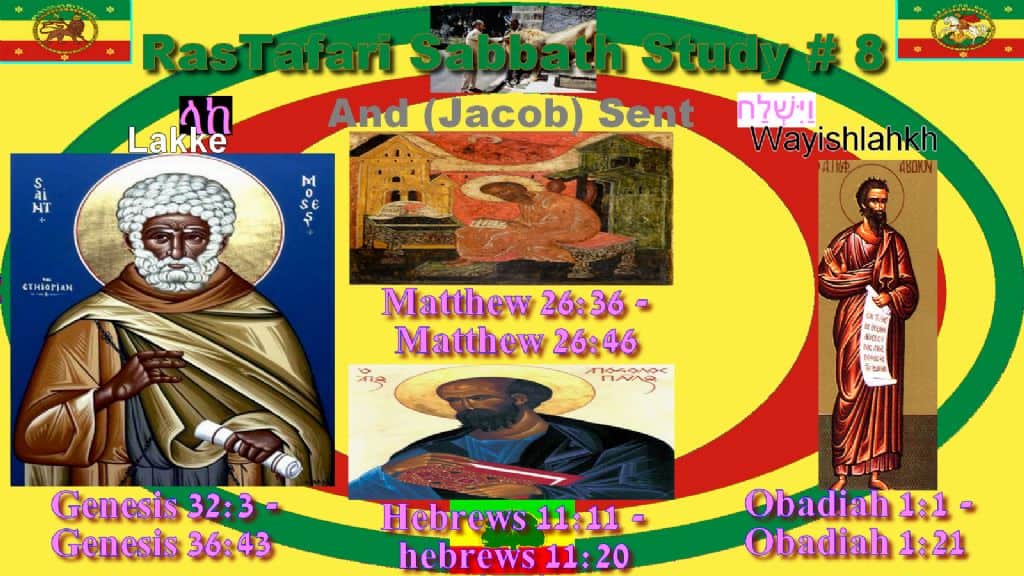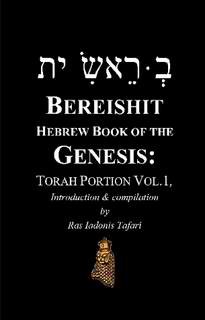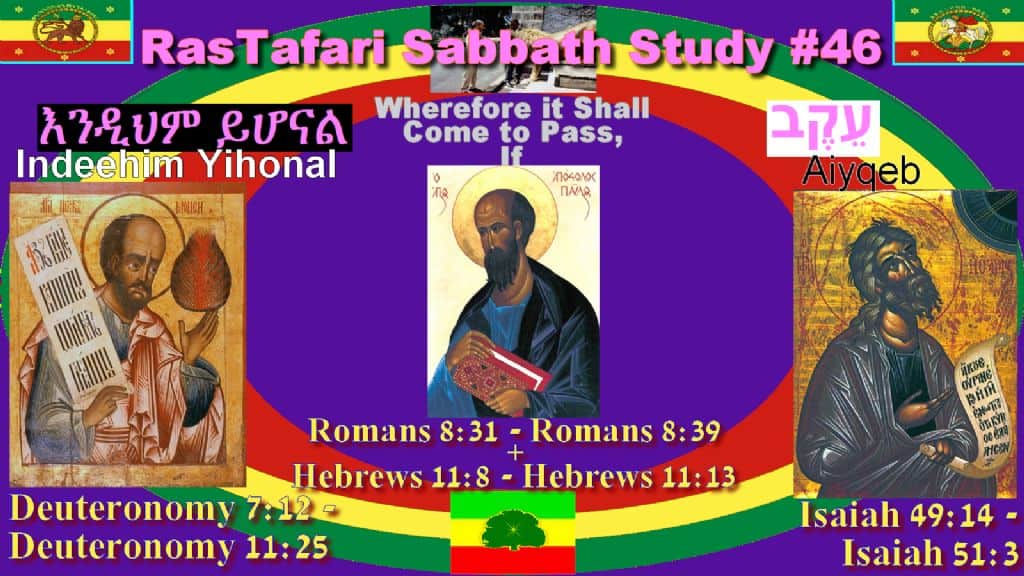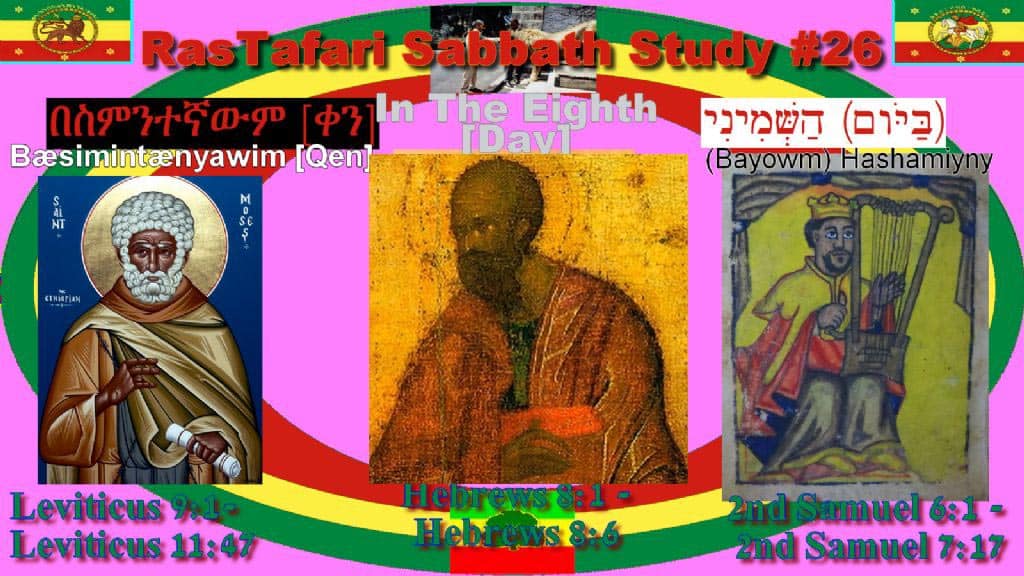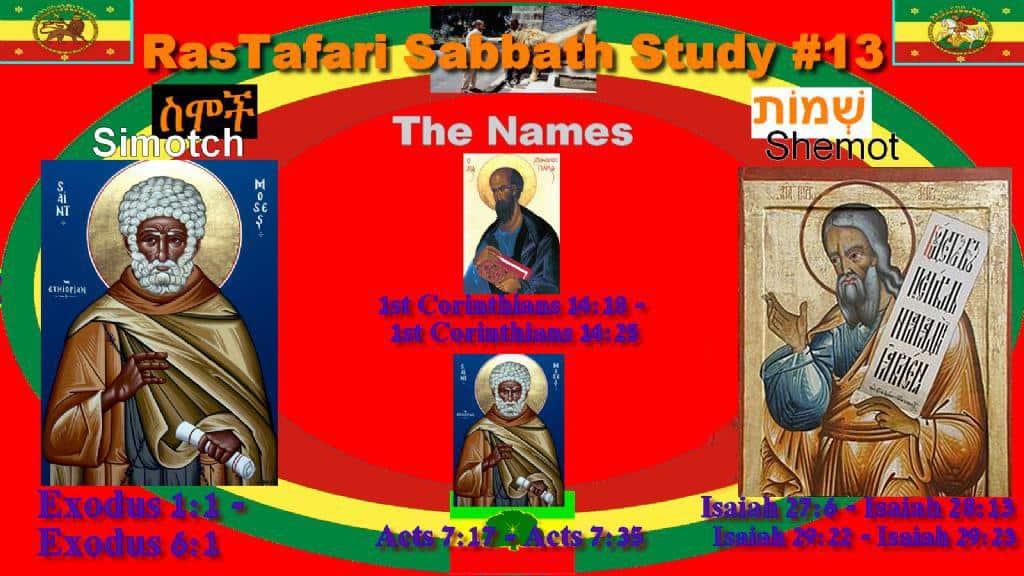This Week's Portion #8
Vayishlach | וישלח | "And he sent" ላከ | Lakke
*For a PDF version of All the Torah Portions Schedule, click here to download!
2. Prophets Reading
Obadiah 1:1-21
3. New Testament Reading
Heb 11:11-20; Matt 26:36-46
Portion Outline - TORAH
- Genesis 32:3 | Jacob Sends Presents to Appease Esau
- Genesis 32:22 | Jacob Wrestles at Peniel
- Genesis 33:1 | Jacob and Esau Meet
- Genesis 33:18 | Jacob Reaches Shechem
- Genesis 34:1 | The Rape of Dinah
- Genesis 34:25 | Dinah's Brothers Avenge Their Sister
- Genesis 35:1 | Jacob Returns to Bethel
- Genesis 35:16 | The Birth of Benjamin and the Death of Rachel
- Genesis 35:27 | The Death of Isaac
- Genesis 36:1 | Esau's Descendants
- Genesis 36:15 | Clans and Kings of Edom
Portion Outline - PROPHETS
- Obadiah 1:5 | Pillage and Slaughter Will Repay Edom's Cruelty
- Obadiah 1:10 | Edom Mistreated His Brother
- Obadiah 1:17 | Israel's Final Triumph
Portion Study Book Download & Summary
BEREISHIT Hebrew Book of Genesis - Torah Portion Vol.1 (FREE PDF)
The eighth reading from the book of Genesis is named Vayishlach (וישלח), which means “and he sent.” The title comes from the first verse of the reading, which says, “Then Jacob sent messengers before him to his brother Esau in the land of Seir, the country of Edom” (Genesis 32:3 [verse 4 in Jewish-published Bibles]). Jacob prepares to meet Esau as he returns to the Promised Land, but first he has a mysterious encounter with an angel in the darkness, who changes his name to Israel. The portion follows Jacob’s adventures in the land of Canaan, including the loss of his beloved wife, Rachel.
Portion Commentary
Jacob and Israel
Thought for the Week:
God named all three of the patriarchs. He changed Abram’s name to Abraham. He chose Isaac’s name and announced it to Abraham before the child was even conceived. In this week’s Torah portion, He changes Jacob’s name to Israel.
Commentary:
As he prepared to face Esau, Jacob experienced a strange mystical encounter with God. He had sent his family, his servants and his possessions across a river ahead of him. He was about to follow when he was suddenly attacked by an assailant. Jacob wrestled the man through the night. The attacker turned out to be none other than the angel of the LORD.
Jacob wrestled with the angel through the night. He would not let the angel go. Jacob said to the angel, “I will not let you go unless you bless me” (Genesis 32:26)
The angel blessed Jacob by changing his name to Israel. Later in this week’s portion, in Genesis 35, the name change is repeated. When Jacob returns to Bethel, the LORD tells him, “‘Your name is Jacob; you shall no longer be called Jacob, but Israel shall be your name.’ Thus He called him Israel” (Genesis 35:10).
Rashi explains this name change as if the angel said, “No longer shall you be called Yaakov, because they will no longer say that the blessings came to you by means of trickery (yakav, יעקב) and deceit. You shall be called Yisrael (ישראל), because you have been publicly authorized (sararah, שררה) to receive the blessing.”
The name Jacob represented Jacob’s life before encountering God, his old nature. The name Israel represented Jacob’s life after encountering God. It represented his new nature and new destiny.
A genuine encounter with God is life-changing. It is a sort of wrestling match. The apostles teach us that, through faith in Yeshua, we are born again as new creations. In Messiah we have a whole new identity. Paul speaks of our old identity as the “old self.” He declares that, for the believer, the “old self was crucified with [Messiah], in order that our body of sin might be done away with, so that we would no longer be slaves to sin” (Romans 6:6). “Therefore if anyone is in Messiah, he is a new creature; the old things passed away; behold, new things have come” (2 Corinthians 5:17).
Middot U’Mitzvot (Character and Deeds)
Bad Company
Now Dinah the daughter of Leah, whom she had borne to Jacob, went out to visit the daughters of the land. (Genesis 34:1)
Our social circles are important. We become like the people we hang around with. We absorb their values and tend to imitate their behavior. In all innocence, Dinah the daughter of Jacob wanted to spend time with the teenage girls of Shechem. It was the wrong place for her. She did not belong with the Canaanite teenagers.
If we want to keep our children on a moral path, we cannot place them in the midst of immoral children. No matter how godly and upright our sons and daughters are, regardless of how well we have raised them, we cannot expect them to prevail over the laws of sociology. When we allow them to socialize with a peer group that holds a different set of values, our children will inevitably adopt those values. It’s not a conscious thing. Many families have seen years of godly training vanish after sending their children to school or allowing them to interact with worldly peers.
The same principle applies to all of us. Though we are to be a light to the world, we are not to be of the world. The people of God are supposed to be a different type of people altogether. In order to be different, we need to maintain strong boundaries.
This means missing out on lots of opportunities the world has to offer. Had Jacob said, “No, Dinah, I don’t want you hanging out with those Canaanite girls,” she probably would have felt like she was being cheated out of fun and adventure. “But Dad,” she would have complained, “it’s not fair.”
Being chosen by God to be a holy people isn’t fair either. It is a privilege.

